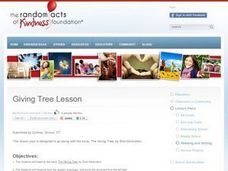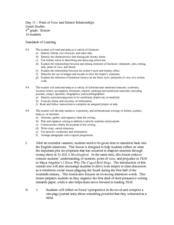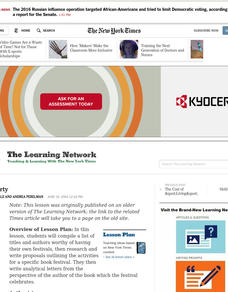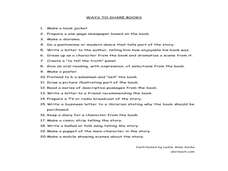Curated OER
Giving Tree Lesson
Students read and respond the book, The Giving Tree. In this literary unit, students listen to the story and discuss the story using Bloom's Taxonomy. Students write a letter of empathy to the tree and observe the changes the tree went...
Curated OER
THE TRAVELS OF BABAR: An Adventure in Scale:Saving the Elephants and Other Endangered Animals
Students comprehend the concept and causes of extinction and endangerment. They identify extinct and endangered animals. Students coordinate a plan to help endangered animals through a poster and letter writing campaign.
Curated OER
Writing Assessment Development Scale
In this language arts worksheet, 2nd graders are assessed in their writing ability according to a formal assessment. The sheet classifies them into different categories.
Curated OER
Reader's Theater, Get Ready
Students recognize what features make a play. For this reader's theater lesson, students read the play Master Man: A Tall Tale of Nigeria told by Aaron Shepard and determine what features make this a play and what the author's purpose was.
Curated OER
Friendship and Death
Fourth graders share their thoughts and feelings about friendship and death and connect them with those of the characters in the book, The Bridge to Teribithia. They complete a friendship picture book and write a letter as one of the...
Curated OER
Point of View and Mentor Relationships
Tenth graders analyze the role of mentors, point of view, and prejudice using the texts of To Kill a Mockingbird and Maya Angelou's I Know Why the Caged Bird Sings. In this literature analysis instructional activity, 10th graders...
EngageNY
Grade 10 ELA Module 2: Unit 1, Lesson 19
Great minds think alike. Scholars read two texts and compare how the authors develop the same central idea. Readers analyze "Women" by Alice Walker and "Letter from Birmingham Jail" by Martin Luther King Jr. They discuss word use and new...
Curated OER
Pen Pals
Students collect bird count data at their sites, and share and compare the data collected from two different schoolyards using computer technology.
Curated OER
Narrative Literature Response Letters
Third graders write endings to a story that has already been written. They offer alternative endings in their version. The instructional activity includes a rubric that is to be given to the students in order that they know the...
Curated OER
Book Party
Students compile a list of titles and authors worthy of having their own festivals, then research and write proposals outlining the activities for a specific book festival. They write analytical letters from the perspective of the author...
Curated OER
Evil Eagles
Students complete a variety of activities related to the long /e/ sound. As a class they recite a tongue twister, and write the letter E. Students then listen to word pairs and identify the word in each pair that contains the long /e/...
Curated OER
The Power of the Pen
Students discuss the personal and historical significance of journals, analyze the issues raised in a N.Y. Times article regarding Anne Frank's diary, and evaluate a Letter to the Editor written in response to the article.
Curated OER
Beach Theme
Students practice b words, search for sea shells, write on beach post cards, and more, all to learn about the beach. Students also wear sun hats around the room.
Curated OER
Out of the Dust--Appeals to Senses
Students list examples of appeals to the senses in the poem Out of the Dust. In this Out of the Dust lesson, students discuss ways that the author brings the story alive through appeals to the senses. Students discuss...
Curated OER
Organizing One’s Thoughts
Students take a closer look at the organization of written pieces. In this writing skills lesson, students examine transitions, repetition, parallelism, and other organizational patterns in writing.
Curated OER
Yoko and the Sushi Party
Students listen to a read aloud of Rosemary Wells, Yoko as they begin a study of Japanese culture and customs. They experience Japanese food, geography and culture. They write a friendly letter to the author.
Curated OER
The Call of the Wild
Students read The Call of the Wild, noting its theme of survival. They investigate the book's concepts with word webs, spider maps, or graphic organizers. They conduct a panel discussion on dogs and wolves. They write a letter to the...
Curated OER
Esperanza Rising - Literature Circles and Review (Day 3)
Kids love working with their peers. Get your class into small literature circles and have them complete weekly assignments. Before beginning this week's activity, have each learner write a letter from Esperanza in California to Abuelita...
Curated OER
Hawthorne: Author and Narrator
Students read various pieces of literature by Nathaniel Hawthorne to recognize the difference between a narrator and author. Students in small groups report on the narrative point of view represented in a story they have read.
Curated OER
Analyzing Speaker, Language, and Tone in the Writings of Benjamin Franklin
Students analyze writings by Benjamin Franklin. For this Benjamin Franklin lesson, students discover the pseudonyms under which Franklin used to write. Students compare and contrast 2 selections by Franklin.
Pennsylvania Department of Education
Writing with Beans
Students become familiar with the letters in a word by pasting beans on it. In this Bean writing lesson, students make words using navy beans. Students color or paint the beans.
Project SMART
Rocks and Minerals: Touch the Earth
Students complete a unit of lessons on rocks and minerals. They conduct research, write e-mail questions to geologists, write daily journal entries, label maps demonstrating types of rocks/minerals found, and create a web page that...
Curated OER
A Multigenerational Pen Pal Program
Learners discover the benefits of writing letters to multigenerational pen pals. In this pen pal lesson, students identify a need for communication among the generations. Learners begin a pen pal program with the elders in...
Curated OER
Ways to Share Books
In this book report idea sheet, students are given a list of 20 possibilities for creating a non-traditional book report (e.g., making a diorama; making a poster).

























